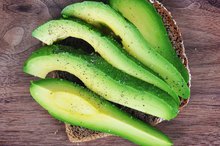What does fact checked mean?
At Healthfully, we strive to deliver objective content that is accurate and up-to-date. Our team periodically reviews articles in order to ensure content quality. The sources cited below consist of evidence from peer-reviewed journals, prominent medical organizations, academic associations, and government data.
The information contained on this site is for informational purposes only, and should not be used as a substitute for the advice of a professional health care provider. Please check with the appropriate physician regarding health questions and concerns. Although we strive to deliver accurate and up-to-date information, no guarantee to that effect is made.
List of Foods That Affect Protime
Protime, also known as prothrombin time or PT/INR, is a blood test that measures how long it takes your blood to clot. Protime is checked regularly if you take warfarin, a blood-thinning medication that prevents dangerous clots from forming and blocking blood vessels in your heart or brain. Certain foods affect protime. Follow your physician's instructions if you need to avoid foods that affect your protime.
Protime and Vitamin K
Vitamin K interacts with warfarin and affects protime. A sudden Increase in your vitamin K intake decreases the effect of warfarin and increases your risk of a blood clot. Conversely, a large decrease in your intake of vitamin K increases the effect of warfarin and increases your risk of bleeding. To keep your protime within the recommended range, take warfarin as directed at the same time every day, keep your vitamin K intake consistent from one day to the next and have your protime checked as prescribed by your doctor.
- Vitamin K interacts with warfarin and affects protime.
- A sudden Increase in your vitamin K intake decreases the effect of warfarin and increases your risk of a blood clot.
Foods High in Vitamin K
The Coumadin Diet
Learn More
Limit foods that provide you with more than 60 percent of the recommended daily value of vitamin K to keep your protime in the target range. Foods high in vitamin K include:
- kale
- boiled spinach
- collard greens
- frozen turnip greens
- Swiss chard
- parsley
- mustard greens
Limit your intake of foods high in vitamin K to one serving per day and foods moderately high in vitamin K to three servings per day. One serving equals 1/2 cup, except for parsley -- one serving equals 1/4 cup.
Alcohol
Drinking more than three alcoholic beverages each day increases the effects of warfarin and your risk of bleeding 2. One drink is equivalent to 5 oz. of wine, 12 oz. of beer or 1.5 oz. of liquor. Some doctors advise their patients to avoid alcohol while taking warfarin. Follow your doctor's instructions.
- Drinking more than three alcoholic beverages each day increases the effects of warfarin and your risk of bleeding 2.
- Some doctors advise their patients to avoid alcohol while taking warfarin.
Herbs and Supplements
Vitamin K Foods to Avoid While on Coumadin
Learn More
Be careful if you add herbs and supplements to your diet, because some affect protime. They include:
- cinnamon
- ginseng
- ginkgo biloba
- ginger
- horse chestnut
- St
John's wort
sweet woodruff
willow bark
wheat grass
turmeric
dong quai
feverfew
arnica
garlic
licorice
sweet clover
red clover
vitamin E
* any supplements that contain vitamin K. Talk to your doctor or pharmacist before taking any herbs or supplements while on warfarin.
Related Articles
References
- Memorial Sloan-Kettering Cancer Center: Cinnamon
- American Family Physician; Herbal Remedies: Adverse Effects and Drug Interactions; Mar. 1, 1999; Melanie Johns Cupp, PHARM.D.
- Lab Tests Online: PT and INR
- Coumadin (warfarin sodium) [package insert]. Princeton, New Jersey: Bristol-Myers Squibb, 20XX.
- Harter K, Levine M, Henderson SO. Anticoagulation drug therapy: a review. West J Emerg Med. 2015;16(1):11-7. DOI: 10.5811/westjem.2014.12.22933
- Patel S, Patel N. Warfarin. In: StatPearls [Internet]. Treasure Island (FL): StatPearls Publishing.
- Tideman PA, Tirimacco R, St John A, Roberts GW. How to manage warfarin therapy. Aust Prescr. 2015;38(2):44-8. DOI: 10.18773/austprescr.2015.016
Writer Bio
Gianna Rose is a registered nurse certified in hospice and palliative care, as well as a certified wellness coach. She completed Duke Integrative Medicine's Mindfulness-Based Stress Reduction course in 2009. Rose also holds a Bachelor of Fine Arts from the Savannah College of Art and Design.









